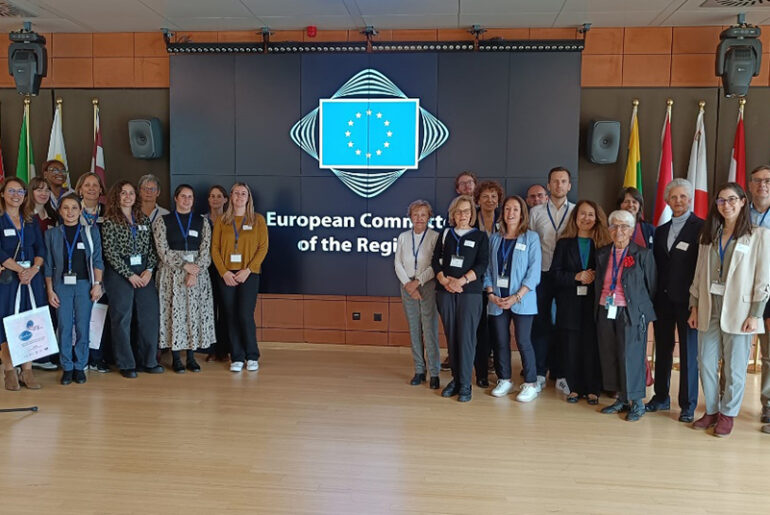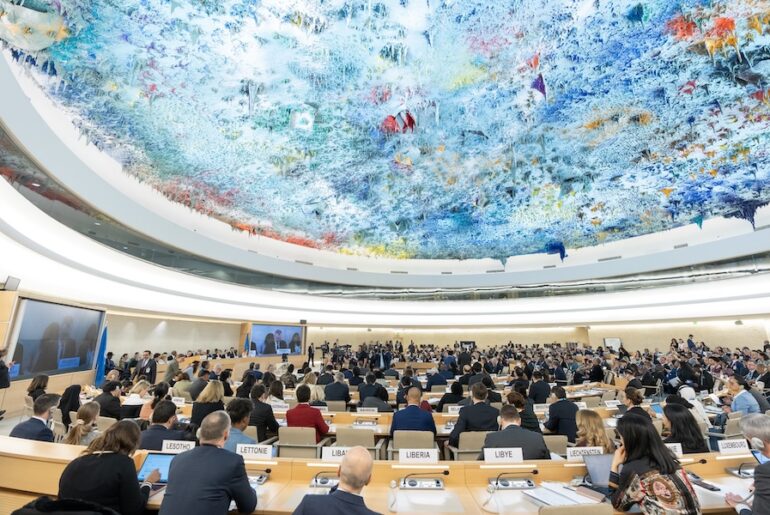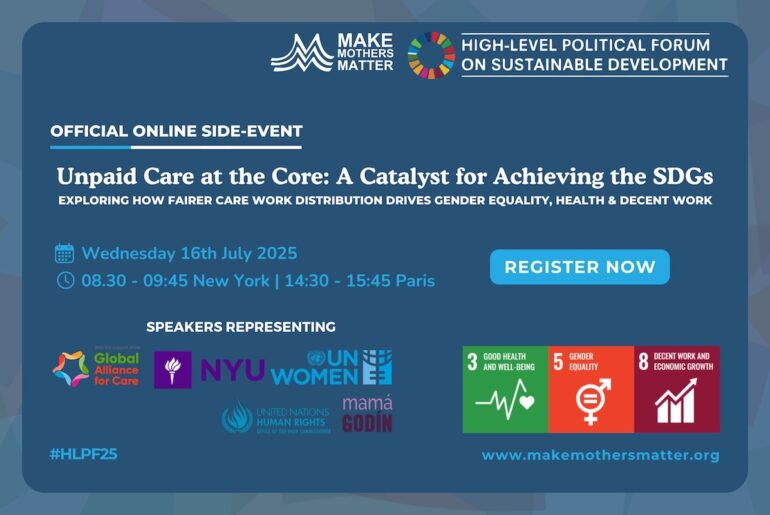Care, a strategic lever for sustainable development
29.07.15
UN New York – On 16 July, we organised a side-event to the UN High Level Political Forum (HLPF) on Centring Unpaid Care to unlock Synergies Across SDGs. Our main objective was to shed light on the inter-linkages between unpaid care work and SDGs, in particular SDG5, SDG3 and SDG8, which were all under review this year, and showcase examples of good practices and policies that place care at the centre of policymaking thereby creating powerful synergies across sectors and goals.
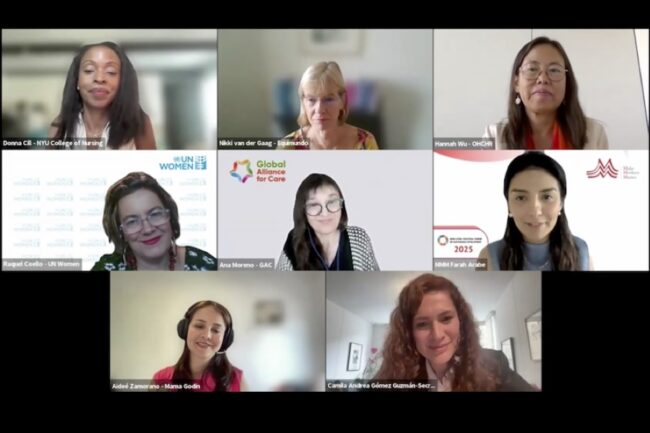
Our main objectives:
- Highlight the centrality of care to the realisation of many SDGs beyond SDG 5, in particular SDG 3 and SDG 8
- Show how addressing the issue of the inequitable distribution of unpaid care and domestic work in a cross-sectoral manner can foster synergies, thereby contributing to the implementation of SDG 3 (including early childhood development, mental health) and SDG 8 (including women’s labour force participation, a just transition)
- Provide concrete examples of policies and practices that have successfully created such synergies
- Call on governments at every level to implement cross-sectoral care systems that recognise, support and redistribute the unpaid work of caring
Key take aways
- Care is a strategic lever for sustainable development, cutting across sectors and goals. It must be institutionally embedded within policy planning and implementation at all levels, from local to global, to drive progress toward the 2030 Agenda
- The unequal distribution of unpaid care work is both a driver and consequence of gender inequality, with profound implications for women’s physical and mental health, labor force participation, and access to rights, particularly among mothers, migrants, and those facing intersecting forms of marginalisation
- Advancing care systems requires a paradigm shift toward intersectorialtional, inclusive, and life-course approaches that address the needs of both caregivers and care recipients, while acknowledging the diversity of caregiving arrangements and realities
- Reframing care as a collective social and economic responsibility is essential. This demands a move away from its relegation to the private sphere and toward its recognition as a public good, funded, legislated, and institutionalized as a matter of justice and societal resilience
- The current policy moment offers a window of opportunity. Global milestones, including Beijing+30, the World Social Summit, and regional reviews, must be leveraged to elevate care within global development frameworks and ensure accountability for care-centered, gender-transformative action.
![]() Read the event’s reports with take-aways from each speaker
Read the event’s reports with take-aways from each speaker
Recording of the event
Program
Welcome & introduction
- Farah Arabe, Representative to the UN in New York, Make Mothers Matter
Moderator
- Raquel Coello Cremades, Policy advisor macroeconomics and Global lead on Care, UN Women
Panellists:
- Donna Cill, Associate Professor and Deputy Director, NYU Rory Meyers College of Nursing – PowerPoint presentation
- Hannah Wu, Chief, Women’s Rights and Gender Section, OHCHR
- Nikki van der Gaag, Consultant & Writer; Senior fellow at Equimundo – PowerPoint presentation
- Aideé Zamorano, Founder and President, Mama Godin, Mexico – PowerPoint presentation
- Camila Gómez Guzmán, Director, District Care System, City of Bogota, Colombia – PowerPoint presentation
Concluding remarks
- Ana Moreno, Technical Secretary, Global Alliance for Care
We thank our speakers for ‘connecting the dots’ by sharing their expertise on the linkages between global crises, in particular climate change and the debt crisis, women’s unpaid care work, and our economic system.
This webinar was a side-event to the 2025 High Level Political Forum (HLPF), the annual UN meeting to assess the implementation of the 2030 agenda and its 17 Sustainable Development Goals and to discuss the way forward.
See also:
- Our invitation article, with background information, speakers’ bio and additional resources
- Our HLPF written statement on Placing Target 5.4 at the Core: A Key to Accelerating SDG Synergies
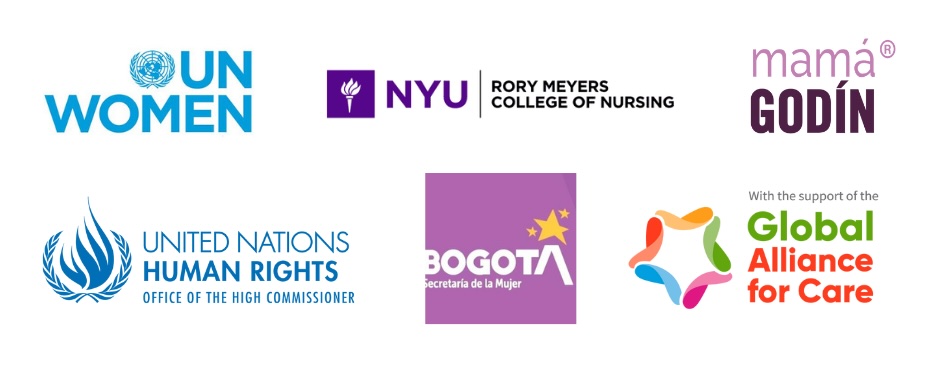
The New EU Gender Equality Roadmap : A Call for Inclusion of Mothers
04.03.25
The European Commission’s initiative on a new Gender Equality Roadmap post-2025, marks a significant step forward in addressing gender disparities across the European Union. Make Mothers Matter (MMM
Sharing is caring:
equal parenting, a path to social cohesion?
27.01.25
UN New York, UN Commission on Social Development – Register now to our virtual side-event for a discussion on how a more equal sharing of unpaid care and domestic work
Child and Family Support in Europe : ensuring families receive the best possible care
05.12.24
We were delighted to coorganise, together with the European Parents Association (EPA), the “Quality Assurance in Child and Family Support in Europe: Policy Lessons for Evidence-Informed Decision


